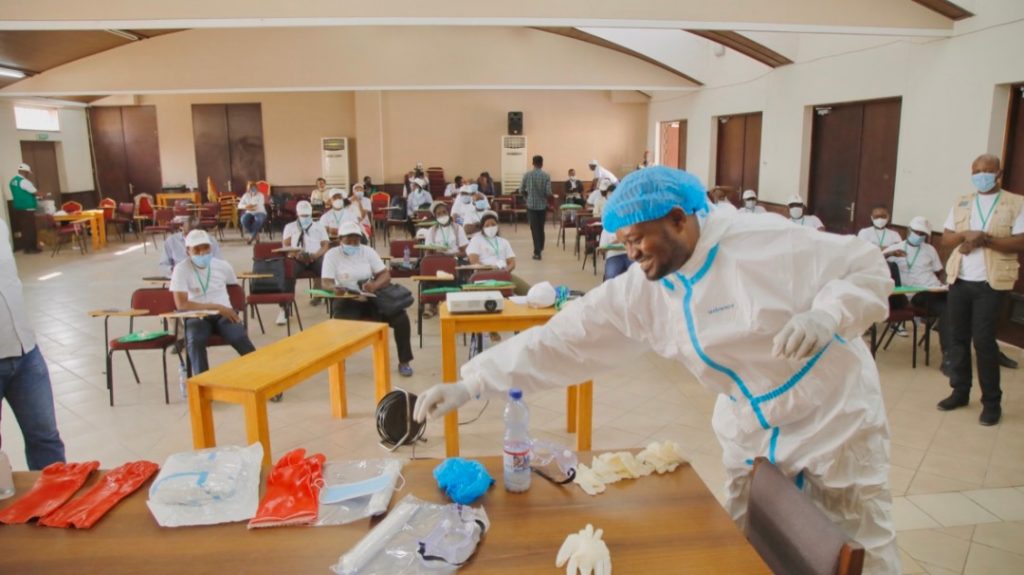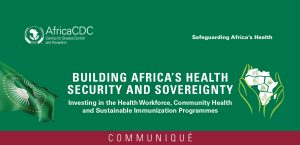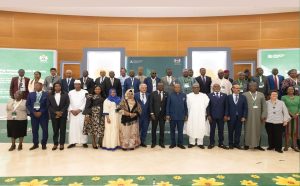The Infection Prevention and Control Technical Working Group of the Africa Task Force for Coronavirus Response (AFTCOR) held a special virtual workshop to promote manufacturing of personal protective equipment (PPE) in Africa on Thursday, 3 September 2020. Over 300 participants representing policymakers, regulatory agencies, the private sector, government and non-government institutions, manufacturers and distributors of PPE, PPE technical experts, multilateral and bilateral organizations, attended the workshop.
In his opening address, Dr John Nkengasong, Director of Africa CDC, said with a population of about 1.3 billion Africa cannot continue to import over 95% of its PPE requirements. He said adequate and continuous supply of PPE is needed to protect vulnerable healthcare workers from being infected while caring for others.
H.E. Otunba Adeniyi Adebayo, Nigeria’s Minister for Trade, Industry and Investment, represented by the Permanent Secretary of the ministry, Dr Sani-Gwarzo, said given the right resources, support and enabling environment, entrepreneurs in Africa can help meet the PPE need in Africa by manufacturing them locally.
H.E. Mr Wamkele Mene, Secretary-General of the Africa Continental Free Trade Area highlighted the need to protect the intellectual property rights and trademarks of manufacturers in the continent as a way of promoting innovation and productivity.
In the wake of the COVID-19 pandemic, African countries have faced serious challenges providing PPE for their healthcare workforce because over 90 percent of the PPE used in Africa are manufactured outside the continent. With the global lockdown and heightened demand for PPE by all countries it became difficult to source PPE from foreign companies whose countries also needed the PPE for their healthcare workers.
This workshop was therefore organized to respond to the growing and urgent need for local manufacturing of high-quality and standardized PPE to meet the increasing demand in the continent.
The workshop featured three technical sessions: description of PPE and standards testing frameworks; quality assurance systems, small and medium enterprises, and regulatory capacity for PPE; and coordination, provision and procurement of PPE.
Key issues discussed included the need for uniform continental standards for PPE manufacturing (including domestication of international standards), enforcement of the standards, greater collaboration between national regulatory agencies for sharing best practices, resource mobilization, procurement of raw materials, post-marketing surveillance, and the protection of intellectual property rights and patents.
Dr Pauline Wairimu made a presentation on the Kenyan experience, highlighting the challenges and successes the national regulatory agency faced with assessing and enforcing standards. There were presentations on quality assurance systems and post-marketing surveillance by UNICEF and the South African Bureau of Standards.
Presentations by representatives of large-scale and small-scale PPE manufacturers, particularly Hawasa Company in Ethiopia and Transgreen in Nigeria, highlighted the challenges and opportunities in accessing raw materials, mobilizing resources, marketing, and logistics for PPE supplies in Africa. Several other presentations highlighted challenges with scaling up production, harmonization of regulatory efforts and establishment of a continent-wide regulatory agency.
In his closing remarks, Dr Onyema Ogbuagu, Associate Professor of Infectious Diseases at Yale University, USA, and Chair of Infection Prevention and Control Technical Working Group Logistics Sub-working Group of AFTCOR, highlighted the need to initiate national, regional and continental forums for PPE manufacturers in Africa, and increased collaboration and cooperation between groups and entrepreneurs as critical ingredients for sustainably scaling-up PPE manufacturing in the continent.
The recording of the workshop can be accessed here.







